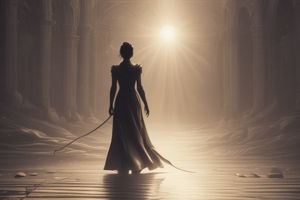Podcast
Questions and Answers
What is the primary source of natural light?
What is the primary source of natural light?
- Sunlight (correct)
- Incandescent Light
- Moonlight
- Fluorescent Light
What type of light is often used to create a cozy and intimate atmosphere?
What type of light is often used to create a cozy and intimate atmosphere?
- Sunlight
- Moonlight
- Incandescent Light (correct)
- Fluorescent Light
What is the purpose of the chiaroscuro technique in visual art?
What is the purpose of the chiaroscuro technique in visual art?
- To create a sense of drama and suspense
- To establish a calm and peaceful atmosphere
- To depict three-dimensional objects on a two-dimensional surface
- To create strong contrasts of light and shadow (correct)
What is the effect of dramatic lighting in artwork?
What is the effect of dramatic lighting in artwork?
What is the role of highlight and shadow areas in visual art?
What is the role of highlight and shadow areas in visual art?
What is the effect of soft lighting in visual art?
What is the effect of soft lighting in visual art?
What is the purpose of natural light in visual art?
What is the purpose of natural light in visual art?
What is the role of light and shadow in visual art?
What is the role of light and shadow in visual art?
What is the primary role of light and shadow in art?
What is the primary role of light and shadow in art?
What technique involves applying thin layers of translucent paint over existing colors?
What technique involves applying thin layers of translucent paint over existing colors?
What is the purpose of frontal lighting techniques in ancient Egyptian art?
What is the purpose of frontal lighting techniques in ancient Egyptian art?
What is the term for creating a delicate transition between two areas?
What is the term for creating a delicate transition between two areas?
What is the goal of setting up a light source when creating a light and shadow study?
What is the goal of setting up a light source when creating a light and shadow study?
What is the term for intersecting lines used to create value and texture?
What is the term for intersecting lines used to create value and texture?
What is the purpose of the practice exercise in creating a light and shadow study?
What is the purpose of the practice exercise in creating a light and shadow study?
What is the primary focus of ancient Greek and Roman art?
What is the primary focus of ancient Greek and Roman art?
What is the role of light and shadow in enhancing composition?
What is the role of light and shadow in enhancing composition?
What is the primary goal of using light and shadow in art?
What is the primary goal of using light and shadow in art?
What technique was used by Renaissance artists to create a three-dimensional effect in their paintings?
What technique was used by Renaissance artists to create a three-dimensional effect in their paintings?
Which artist famously used tenebrism to create a sense of mystery and theatricality in their paintings?
Which artist famously used tenebrism to create a sense of mystery and theatricality in their paintings?
What challenged traditional methods of representing light and shadow in the 19th century?
What challenged traditional methods of representing light and shadow in the 19th century?
What is the term for the darkest part of a form shadow?
What is the term for the darkest part of a form shadow?
What is the primary role of shadows in visual art?
What is the primary role of shadows in visual art?
What type of light source produces soft, subtle shadows?
What type of light source produces soft, subtle shadows?
What is the term for the three-dimensional appearance of an object?
What is the term for the three-dimensional appearance of an object?
Which art movement sought to capture the fleeting nature of light and its effects on the visual perception of objects?
Which art movement sought to capture the fleeting nature of light and its effects on the visual perception of objects?
What is the primary role of light in visual art?
What is the primary role of light in visual art?
Which artist is known for their skillful use of light and shadow to enhance the sculptural qualities of their works?
Which artist is known for their skillful use of light and shadow to enhance the sculptural qualities of their works?
What is the primary function of light and shadow in creating a realistic object?
What is the primary function of light and shadow in creating a realistic object?
What is the term for the technique that uses strong contrasts between light and shadow?
What is the term for the technique that uses strong contrasts between light and shadow?
What is the purpose of overlapping objects in a composition?
What is the purpose of overlapping objects in a composition?
What is the effect of front lighting on a subject?
What is the effect of front lighting on a subject?
What is the effect of strong, bright light on the overall feel of an artwork?
What is the effect of strong, bright light on the overall feel of an artwork?
What is the effect of warm-colored light on the mood of an artwork?
What is the effect of warm-colored light on the mood of an artwork?
What happens when light passes through transparent or translucent materials?
What happens when light passes through transparent or translucent materials?
What is the purpose of studying the interplay of light and shadow in still life?
What is the purpose of studying the interplay of light and shadow in still life?
What is the effect of atmospheric perspective on objects in a composition?
What is the effect of atmospheric perspective on objects in a composition?
What is the recommended approach to mastering the interplay of light and shadow?
What is the recommended approach to mastering the interplay of light and shadow?
What aspect of light sources affects the colors of objects in an artwork?
What aspect of light sources affects the colors of objects in an artwork?
Which type of light source produces darker shadows with well-defined edges?
Which type of light source produces darker shadows with well-defined edges?
What is the effect of direct light sources on highlights and reflections?
What is the effect of direct light sources on highlights and reflections?
What is the role of light source in creating a mood and atmosphere in an artwork?
What is the role of light source in creating a mood and atmosphere in an artwork?
What is the difference between light sources with higher and lower color temperatures?
What is the difference between light sources with higher and lower color temperatures?
Which type of light source is often used in galleries, retail stores, and photography studios?
Which type of light source is often used in galleries, retail stores, and photography studios?
What is the primary benefit of accurately representing cast shadows in artwork?
What is the primary benefit of accurately representing cast shadows in artwork?
What is the primary characteristic of ambient light?
What is the primary characteristic of ambient light?
Why is it important to study natural and artificial light sources?
Why is it important to study natural and artificial light sources?
What is the primary difference between direct sunlight and diffused sunlight?
What is the primary difference between direct sunlight and diffused sunlight?
What is the primary benefit of using artificial light sources in visual art?
What is the primary benefit of using artificial light sources in visual art?
What is the primary characteristic of incandescent lighting?
What is the primary characteristic of incandescent lighting?
What is the primary benefit of using LED lighting in visual art?
What is the primary benefit of using LED lighting in visual art?
What is the primary difference between halogen lighting and incandescent lighting?
What is the primary difference between halogen lighting and incandescent lighting?
Why is practice and observation important in developing an understanding of lighting in visual art?
Why is practice and observation important in developing an understanding of lighting in visual art?
What is the primary goal of understanding lighting in visual art?
What is the primary goal of understanding lighting in visual art?
Flashcards are hidden until you start studying
Study Notes
Module 1: Introduction to the Interplay of Light and Shadow in Visual Art
- Light and shadow play a crucial role in visual art, adding depth, dimension, and drama to artwork.
- Artists have been manipulating light and shadow throughout history to create realistic and captivating art.
- The elements of light include:
- Natural light (sunlight, moonlight)
- Artificial light (incandescent, fluorescent, LED)
- Light and shadow can:
- Create form and volume by defining the shape and contours of objects
- Establish mood and atmosphere by evoking emotions and setting the tone
- Enhance composition by guiding the viewer's eye and creating visual interest
Historical Context of Light and Shadow in Art
- Prehistoric art: Early humans used natural materials to create cave paintings, exploiting the uneven surfaces of cave walls to create the illusion of dimension and movement.
- Ancient Egyptian art: Symbolic lighting techniques were used to portray subjects in a balanced and divinely illuminated manner, emphasizing their importance and power.
- Classical Greek and Roman art: The interplay of light and shadow was used to represent the human form, creating a sense of idealized beauty and realism.
- Renaissance art: Artists explored the artistic possibilities of chiaroscuro, emphasizing strong contrasts between light and shadow to create a sense of depth and realism.
- Baroque art: Artists further developed the technique of chiaroscuro, using stark contrasts to create drama and intensity.
- Impressionism and beyond: The representation of light and shadow became more subjective and experimental, with artists seeking to capture the fleeting nature of light.
Understanding the Role of Light and Shadow in Creating Depth and Volume
- Properties of light:
- Light travels in straight lines and casts shadows when objects block its path.
- Light can be absorbed, reflected, or transmitted by different surfaces.
- Role of shadows:
- Shadows define the shape and form of objects, providing a sense of depth.
- Shadows create contrast and drama in an artwork, enhancing visual interest.
- Types of shadows:
- Cast shadows: created when objects block the light, resulting in a visible shadow on a surface.
- Form shadows: occur on the object itself, caused by the absence of light on curved surfaces.
- Core shadows: the darkest part of a form shadow, usually found on rounded objects.
- Reflected shadows: cast by nearby surfaces, bouncing light back onto the object.
Module 2: Basic Principles of Lighting in Visual Art
- Key light and shadow:
- The interplay between light and shadow is essential for creating visually captivating artwork.
- The key light refers to the primary source of light illuminating the subject.
- Direction of light:
- The direction from which the light falls on the subject affects how it is perceived.
- Experimenting with different lighting angles can produce various effects.
- Intensity and contrast:
- The intensity of the light source influences the overall feel of the artwork.
- A strong, brighter light creates high contrast with deep shadows, resulting in a more dramatic effect.
Types of Light Sources and Their Effects
- Natural light sources:
- Direct sunlight: sharp, well-defined shadows and high contrast.
- Diffused sunlight: softer, more evenly diffused light and minimizes harsh shadows.
- Artificial light sources:
- Incandescent lighting: warm, yellowish tones, cozy and nostalgic atmosphere.
- Fluorescent lighting: cool, bluish tones, bright and even illumination.
- LED lighting: highly energy-efficient, wide range of color temperatures.
- Halogen lighting: bright, white light, high color temperature, ideal for tasks that require accurate color rendering.
Effects of Light Sources in Visual Art
- Color temperature:
- Light sources with higher color temperatures emit cooler tones.
- Light sources with lower color temperatures produce warmer tones.
- Shadows:
- The intensity, direction, and sharpness of shadows are influenced by the type of light source.
- Highlights and reflections:
- Different light sources affect the highlights and reflections on objects differently.
- Mood and atmosphere:
- The type of light source can greatly contribute to the mood and atmosphere of a piece of artwork.
Studying That Suits You
Use AI to generate personalized quizzes and flashcards to suit your learning preferences.




